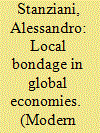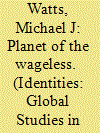| Srl | Item |
| 1 |
ID:
121981


|
|
|
|
|
| Publication |
2013.
|
| Summary/Abstract |
This paper compares the definitions, practices, and legal constraints on labour in Britain, France, Mauritius, and Reunion Island in the eighteenth and nineteenth centuries. It argues that the way in which indentured labour was defined and practised in the colonies was linked to the definition and practice of wage labour in Europe and that their development was interconnected. The types of bondage that existed in the colonies were extreme forms of the notion, practices, and rules of labour in Europe. It would have been impossible to develop the indenture contract in the British and French empires if wage earners in Britain and France had not been servants. The conceptions and practices of labour in Europe and its main colonies influenced each other and were part of a global dynamic.
|
|
|
|
|
|
|
|
|
|
|
|
|
|
|
|
| 2 |
ID:
109970


|
|
|
| 3 |
ID:
148275


|
|
|
|
|
| Summary/Abstract |
This article examines how Koreans became industrial workers in the first and second phases of industrialisation on the peninsula: under Japanese colonial rule, 1931–45 and under the DPRK’s post-Korean War heavy industrialisation, 1953–60. While the political regimes of the Japanese colony and postcolonial DPRK were different, industrialisation occurred under similar conditions, characterised principally by war, state capitalism and imperialism. Processes of proletarianisation also reveal similarities in the two periods, including the widespread use of forced mobilisation and immobilisation of workers, and a bureaucratic apparatus supporting close control of labour. The article contributes to the critique of conventional views about the role of ‘free wage labour’ during the transition to capitalism.
|
|
|
|
|
|
|
|
|
|
|
|
|
|
|
|